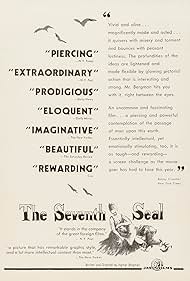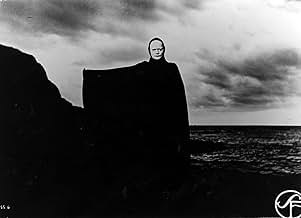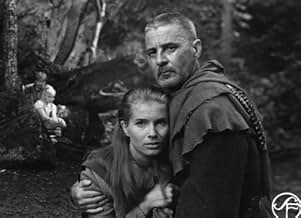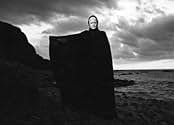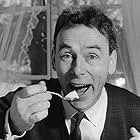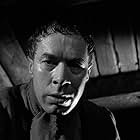A knight returning to Sweden after the Crusades seeks answers about life, death, and the existence of God as he plays chess against the Grim Reaper during the Black Plague.A knight returning to Sweden after the Crusades seeks answers about life, death, and the existence of God as he plays chess against the Grim Reaper during the Black Plague.A knight returning to Sweden after the Crusades seeks answers about life, death, and the existence of God as he plays chess against the Grim Reaper during the Black Plague.
- Awards
- 9 wins & 2 nominations total
Siv Aleros
- Flagellant
- (uncredited)
Sten Ardenstam
- Knight
- (uncredited)
Harry Asklund
- The Landlord
- (uncredited)
Benkt-Åke Benktsson
- Merchant at the Inn
- (uncredited)
Summary
Reviewers say 'The Seventh Seal' delves into mortality, faith, and existential questions through its medieval setting. The chess game with Death symbolizes humanity's struggle against fate. Themes of societal chaos and religious fervor are depicted through plague, witch burnings, and flagellants. Characters like the knight, squire, and actors provide varied perspectives on life and death, enriching the narrative. The film's allegorical approach resonates with contemporary audiences, highlighting the timeless nature of its themes.
Featured reviews
Death, Death, Death. No matter the moves you make, Death will, in time, have you in checkmate. The Seventh Seal is a rightfully highly regarded film. It is a unique film, and unlike any I have ever seen. I have just finished my second viewing of the film. I have watched several Bergman films since I first saw this, but this is the one that has always stuck out to me the most. I would describe it as a dark and powerful film. There is nothing lacking in this film, in my opinion. The soundtrack is perfectly subtle, acting is agreeable, cinematography fitting and well done, etc. My favorite aspect of this film is simply the premise. A game of chess that is a matter of life and death. If nothing else, that concept is enough to make an interesting film at the very least. Death is the most persistent theme throughout the film, and is often juxtaposed to stark scenes of life, often quickly and without warning. This film was one of the first I watched in my everlasting pursuit of classic cinema, and I would readily recommend it as a starting point for anyone interested in classic or foreign films. Bergman will not disappoint in this one or elsewhere in his filmography. This is probably his most famous and accessible films. This is a staple of classic cinema, watch it and find out why.
THE SEVENTH SEAL is a film that presents a dramatic fantasy game between meaning of life and fear of death. A knight and his squire have returned to their country after a ten-year crusade. Deadly disease ravaged country. Knight faces Death. He calls Death on the multi-day game of chess...
The story has touched serious philosophical and religious topics. However, the story is full of intrigue, dark humor and hope. The protagonists are distracted between the vicious disease, self-pity and torture. It is interesting to see a deeply disillusioned knight, a cynical squire who hates women, a cheating wife, evil priests, a mute girl and seemingly healthy and happy family on the same road. The truth is all around them. The main protagonist used to persistently ask questions to which only he has a valid response. This film reveals some controversial issues. Is deadly disease greater threat to man or the man is the greatest enemy to himself? Mr. Bergman has painted realistic effects of fear, horror, cynicism, surprises, love and health on human faces.
Max von Sydow as Antonius Block, the knight is a more serious version of Don Quixote. Gunnar Björnstrand Jöns, the squire is a character who never changes his mood. He always has some sort of cynical jokes or words of contempt for each occurrence. Bengt Ekerot is Death in the true sense of that word. Nils Poppe as Jof is a juggler who has strange predictions. Fortunately, no one believes him. Bibi Andersson as Mia, Jof's wife is a beautiful and cheerful woman who does not fit into the landscape.
Life is a hard journey. The rare moments of happiness are a sort of salvation. The end of the film emphasizes the transience of life and the power of death which no one can escape. Of course, only in the eyes of one of the protagonists.
The story has touched serious philosophical and religious topics. However, the story is full of intrigue, dark humor and hope. The protagonists are distracted between the vicious disease, self-pity and torture. It is interesting to see a deeply disillusioned knight, a cynical squire who hates women, a cheating wife, evil priests, a mute girl and seemingly healthy and happy family on the same road. The truth is all around them. The main protagonist used to persistently ask questions to which only he has a valid response. This film reveals some controversial issues. Is deadly disease greater threat to man or the man is the greatest enemy to himself? Mr. Bergman has painted realistic effects of fear, horror, cynicism, surprises, love and health on human faces.
Max von Sydow as Antonius Block, the knight is a more serious version of Don Quixote. Gunnar Björnstrand Jöns, the squire is a character who never changes his mood. He always has some sort of cynical jokes or words of contempt for each occurrence. Bengt Ekerot is Death in the true sense of that word. Nils Poppe as Jof is a juggler who has strange predictions. Fortunately, no one believes him. Bibi Andersson as Mia, Jof's wife is a beautiful and cheerful woman who does not fit into the landscape.
Life is a hard journey. The rare moments of happiness are a sort of salvation. The end of the film emphasizes the transience of life and the power of death which no one can escape. Of course, only in the eyes of one of the protagonists.
This classic is filled with a lot of memorable images - from the opening scenes on the seashore to the effective concluding shots, creative thoughts are combined with some fine camera work. There are several significant or interesting questions raised by the characters - from the imagery of the "Seventh Seal" in Revelation, to their simple but important concerns about eternity - but it is the way that the visuals play off of the ideas that make the movie so worthwhile.
The recreation of the medieval world is convincing and effective, with a lot of detail to set off a varied assortment of characters with different personalities and perspectives. The characters are not necessarily very deep, but most are interesting, and are worth caring about. The ways that they deal with their discouraging situation make you wonder what it would have been like to live in their world. It's also a movie that in some respects is even better to watch over again, after you already know what has happened and can then pick up even more of the detail and imagery.
No doubt the somber tone and slow pace will always keep it from being widely popular, and it's not perfect, but it's satisfying in a different way, and deserves its reputation as a classic.
The recreation of the medieval world is convincing and effective, with a lot of detail to set off a varied assortment of characters with different personalities and perspectives. The characters are not necessarily very deep, but most are interesting, and are worth caring about. The ways that they deal with their discouraging situation make you wonder what it would have been like to live in their world. It's also a movie that in some respects is even better to watch over again, after you already know what has happened and can then pick up even more of the detail and imagery.
No doubt the somber tone and slow pace will always keep it from being widely popular, and it's not perfect, but it's satisfying in a different way, and deserves its reputation as a classic.
One thing that can be certain after watching the Seventh Seal, outside of being thankful for living in this century, is that Bergman knows his film-making- and imagery. He uses subliminal and not so subliminal techniques to convey a dying, frightened world, where making a living is almost impossible and the debate of god's control over life is discussed like un-rhyming yet fascinating poetry.
The result is beautiful cinema, capturing the always foreboding fear and allure of the almighty and for the waiting death, appropriately staged in post-crusades, mid dark age Europe. Max Von Sydow gives an excellent showing as the opponent of Death (in a clever and meticulous chess game), yet the character of Death, played by Bengt Ekerot with chilling conviction, steals the show, if only for the alluring quality of the character.
Even if the story veers it veers in good and interesting territory, focusing on people who convey Bergman's point and or style. I can't reveal what the bottom line point is (many newcomers to Bergman's work won't either, especially if you're not in the mood for soul searching), but one thing is for certain, an allegory on life and death is shown perfectly in the second to last shot of the reaper and his minions following in a dance across the field. This is one of the most pure of cinema's masterpieces and certainly Bergman's best cine. A++
The result is beautiful cinema, capturing the always foreboding fear and allure of the almighty and for the waiting death, appropriately staged in post-crusades, mid dark age Europe. Max Von Sydow gives an excellent showing as the opponent of Death (in a clever and meticulous chess game), yet the character of Death, played by Bengt Ekerot with chilling conviction, steals the show, if only for the alluring quality of the character.
Even if the story veers it veers in good and interesting territory, focusing on people who convey Bergman's point and or style. I can't reveal what the bottom line point is (many newcomers to Bergman's work won't either, especially if you're not in the mood for soul searching), but one thing is for certain, an allegory on life and death is shown perfectly in the second to last shot of the reaper and his minions following in a dance across the field. This is one of the most pure of cinema's masterpieces and certainly Bergman's best cine. A++
10Xstal
An abstraction of your fears, conjured progressively through years, walks beside you every day, may cause some to halt, then pray; it's a demon that's passed on, through generations come and gone, as fixed and certain as the tide, nowhere for you to run, or hide; is there a game that you can play, that extends your time and stay, with instructions and some rules, that don't leave you, as the fool; can the clock that's counting down, tick half as fast before you frown, and gaze with stoical askance, as you begin, your macabre dance.
Signed, sealed and delivered as many times as you may care for, but the curse of existence is never knowing how the story really ends, or why it was started in the first instance.
Signed, sealed and delivered as many times as you may care for, but the curse of existence is never knowing how the story really ends, or why it was started in the first instance.
Did you know
- TriviaIngmar Bergman credited the film with helping him overcome his crippling fear of death. Because the film dealt so overtly with the subject, he found it a highly cathartic experience.
- GoofsThe chess players focus on capturing the Queen. The Queen was not a super-powerful piece until centuries later when a recent chess-variant initially called "chess of the mad queen" became more popular than the classic game.
- Quotes
Antonius Block: We must make an idol of our fear, and call it god.
- ConnectionsEdited into Severed Ways: The Norse Discovery of America (2007)
Details
- Release date
- Country of origin
- Languages
- Also known as
- El séptimo sello
- Filming locations
- Hovs Hallar - Naturreservat, Skåne län, Sweden(Opening beach scene and ending scene)
- Production company
- See more company credits at IMDbPro
Box office
- Budget
- $150,000 (estimated)
- Gross worldwide
- $312,104
- Runtime1 hour 36 minutes
- Color
- Aspect ratio
- 1.37 : 1
Contribute to this page
Suggest an edit or add missing content

